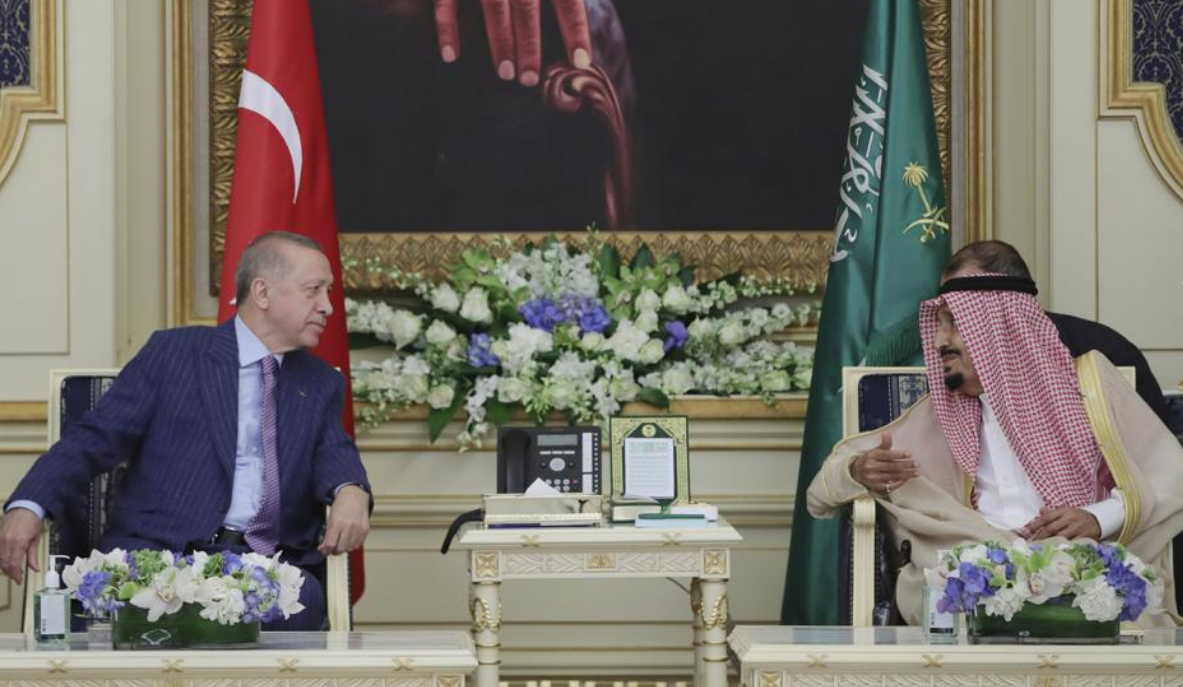Turkish President Recep Tayyp Erdogan converses with Saudi King Salman in Riyadh on Friday, April 28th, 2022 (Office of the Turkish Presidency, via AP).
Jerusalem — The spate of Ramadan violence continued in the Promised Land this week, as two Palestinians murdered a 23-year-old security guard at the entrance of the West Bank settlement of Ariel on Friday evening, while Israelis began observing Shabbat. Israeli security forces traced the attackers back to the nearby town of Qarawat Bani Hassan, where they were arrested without incident. The al-Aqsa Martyr’s Brigade, the militant faction of the ruling Fatah movement in the West Bank, claimed responsibility for the attack.
The Ariel murder comes as the Israeli Border Police continued to confront Palestinian rioters atop the Temple Mount in Jerusalem’s Old City on Thursday, and as Palestinian demonstrations continued in the contentious Sheik Jarah neighborhood of East Jerusalem. Although tensions between Palestinian forces and the IDF have risen during the Ramadan holiday this year, overall levels of violence have been much lower compared to the same time last year, when a housing dispute in Sheik Jarah became the pretext for widespread unrest in East Jerusalem, sparking a conflict between Israel and Hamas in the Gaza Strip.
A more concerning trend has been the increasing prevalence of firearms in the West Bank, used recently in several terrorist attacks against Israeli security personnel and civilians, including the Ariel attack on Friday. Both Israeli and Jordanian intelligence agencies have reported a notable increase in weapons smuggling from Syria into the West Bank, sponsored by Iran, with the expressed purpose of facilitating attacks within Israeli territory. An attempt to smuggle 100 grenades and 2 firearms into Israel through Lebanon was foiled by Israeli security forces on Monday, underscoring the scope of Iran’s effort to sow violence in Israel.
Iraqi Kurdistan - Turkey’s ongoing operation against Kurdish PKK militants continued in Iraqi Kurdistan this week, as video published to social media showed Turkish attacks on PKK positions in the Amadiya District of Duhok Province. Turkey has pursued PKK militants in Iraq since 2015, when the PKK temporarily abandoned their insurgency against the Turkish government to focus on the advance of the Islamic State in the Sinjar region, where the vulnerable Yezidi community was under siege.
In addition to the Turkish “Claw-Lock” offensive, the Iraqi military has also engaged the PKK militia and the PKK-aligned YBS Yezidi defense forces around Mount Sinjar. Tensions between the Iraqi federal government and the PKK/YBS have increased in recent months, as the Iraqi government seeks to reassert control over territory in Northern Iraq, which it abandoned during the early days of the ISIS offensive in July, 2014.
Syrian Kurdistan - The Turkish military also continued to escalate its offensive against the Kurdish-led Syrian Democratic Forces (SDF) militia in Northeast Syria this week, violating ceasefires on at least 10 occasions. Turkish artillery fire terrorized the residents of Zarkan and caused a major power outage in the town of Tel Tamr after a substation was damaged during the attacks.
Tel Tamr has been a frequent target of attacks by the Turkish military and their Syrian Islamist allies since the invasion of Northeast Syria (aka Rojava) in October, 2019. The Turkish-aligned Syrian National Army (SNA), a Syrian Islamist rebel conglomerate, is also engaged in ongoing firefights with the SDF around the former ISIS capital of Raqqa, as the battle continues between the SDF, Turkey, and the Syrian regime for control of the former Caliphate’s territory.
Afghanistan - Ongoing hostilities between the ruling Taliban regime and the Afghani ISIS (ISIS-K) franchise continued last week, as two ISIS-K bombings in the cities of Kabul and Mazar-e-Sharif killed at least 43 people and wounded at least 60. The attacks follow a bombing in Kunduz province which killed over 30 civilians last week, as ISIS-K escalates its insurgency against the Taliban.
Thousands of incarcerated Islamic State fighters were were released from a US military internment facility near Kabul in September, 2021, as Taliban forces closed on the capital city. Although the ISIS-K jihadists initially targeted US forces guarding the Kabul International Airport, killing 170 civilians and 13 US service members in a suicide bombing attack, they have since turned their efforts against the Taliban in an attempt to subvert their rival and establish a new Caliphate in Afghanistan’s ancient territory of Khorasan. Islamic tradition prophesies the formation of an Muslim army in Khorasan which will march across the Middle East to Jerusalem to wage an apocalyptic battle.
Saudi Arabia - In an ongoing effort to undermine the Iranian regime, the Kingdom of Saudi Arabia hosted a visit from Turkish president Recep Tayyip Erdogan this weekend. Relations between the two Sunni powers have been cold since the murder of exiled Saudi journalist Jamal Khashoggi, a critic of the Saudi royal family, who was kidnapped in Istanbul by three Saudi nationals in October, 2018. Khashoggi was taken to the Saudi consulate, where he was subsequently tortured and murdered, ostensibly by the order of Saudi Crown Prince Muhammad bin Salman.
The progressively-minded bin Salman has sought to repair his image on the world stage after the killing of Khashoggi, especially since relations with the United States have worsened during the administration of President Joe Biden. Erdogan’s visit to Riyadh is seen as the latest effort to increase cooperation between Sunni Muslim powers in the region, even as the White House warned this week that the Iranian regime could be “weeks” from developing its first nuclear weapon.
As the incidence of “wars and rumors of wars” continue to increase across the Middle East, we implore the Maranatha global family to join us in prayer for the opening of a “great, effectual door” for Good News in the region. We firmly believe that ongoing hostilities, upheaval and chaos create opportunity for the message of the Prince of Peace.
Maranatha!




